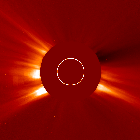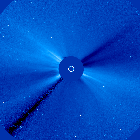|
LASCO
Large Angle and Spectrometric COronagraph

 The LASCO instrument is a set of three coronagraphs
that image the solar corona from 1.1 to 32 solar radii. It is convenient to
measure distances in terms of solar radii. One solar radius is
about 700,000 km, 420,000 miles or 16 arc minutes. A coronagraph is a
telescope that is designed to block light coming from the solar disk, in order
to see the extremely faint emission from the region around the sun, called the corona.
The LASCO instrument is a set of three coronagraphs
that image the solar corona from 1.1 to 32 solar radii. It is convenient to
measure distances in terms of solar radii. One solar radius is
about 700,000 km, 420,000 miles or 16 arc minutes. A coronagraph is a
telescope that is designed to block light coming from the solar disk, in order
to see the extremely faint emission from the region around the sun, called the corona.
The essential questions of solar physics to be addressed by LASCO are:
- How is the corona heated?
- Where and how is the solar wind accelerated?
- What causes coronal transients, and what role do they play in the evolutionary development of large-scale coronal patterns?
The LASCO experiment is investigating the following:
- The transport of mass, momentum, and energy through the corona and into
the solar wind by measuring global distributions of key plasma
parameters and their evolution with time
- The processes that occur in coronal transients, and the conditions that
trigger them
- The interactions of the coronal plasma with dust, by observing the
spatial distribution and the properties of dust particles near the
sun, including those released from sungrazing comets
LASCO was built by a consortium of four US and European institutions:
- Max Planck Institute for Solar System Research (MPS), Germany
- Naval Research Lab (NRL), Solar Physics Branch, United States
- University of Birmingham (DSR), Department of Space Research, UK
- Laboratoire d'Astronomie Spatiale (LAS), France
MPS was responsible for the C1 coronagraph, which images the corona from
1.1 to 3 solar radii. It was also responsible for the door mechanisms and
focus mechanisms for all the telescopes.
|
